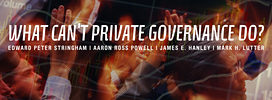Two threads of thought run together for me in the discussions about private policing and about the distinction between private governance and public governance. Aaron Ross Powell and Mark Lutter have both asked where we draw the line between them, a question I have been pondering for many years. Both employ something like Max Weber’s definition of the state, which includes an important qualifier to Lutter’s phrasing: “a territorial monopoly of [legitimate] force,” which I also employ. And while I am largely in agreement with Stringham’s overall thesis, we seem to disagree on the issue of private policing. I think a pointed look at the issue of policing helps nail down the issue of private versus public governance, because policing is the most fundamental case of government’s monopoly of legitimate force.
To begin, Stringham’s argument for the effectiveness of private policing fails because he cannot provide for it the same type of example that he can for contract enforcement—a case where private policing indisputably worked well in the absence of public. His example of private policing in gold rush-era San Francisco may be such an example, but the evidence he is able to provide does not satisfactorily demonstrate that he is not really examining a case of vigilante justice. And his examples of more contemporary private policing occur in the context of that private policing being adjunct to the existence of public policing. These private police provide services in addition to the public police, not in the absence of public police or government.
Put simply, he has not demonstrated that private police don’t gain their legitimacy from the existence of public government. Private police don’t privately prosecute suspects; they hand them over to public police and prosecutors. They don’t privately jail convicted criminals; they leave that to the public government’s prison system.
And that reliance on a public enforcer is, I think, the Weberian key to distinguishing between public and private. Consider Powell’s example of arcologies without an over-arching state above them, where residents have freedom to exit from one and move to another. Do any of those arcologies claim to have a monopoly on the use of force over its members, for example by confiscating property of non-dues payers or confining a violent person? If so, it is the highest level user of force, not constrained in that use by anything except its residents’ willingness to exit. If residents choose not to leave, they have legitimated its use of force. At this point, how can we meaningfully say it is not public governance?
The charter cities movement is of interest to me, and I would hope that it gains strength so that we can see what happens when governments have to operate on a more market-competitive basis. But the proposed charter cities are perhaps private governance only because they are proposed to be established within, and subject to the rules and violence monopoly of, existing states. Seasteading, by contrast, would establish new privately owned territories outside the territorially bound violence monopoly of existing states. Seasteads would, by Weber’s definition, become de facto states themselves. That is, unless residents denied the seastead owners/managers’ authority to use violence.
The perhaps surprising conclusion of this approach is that private policing may be a concept that can only exist within the confines, and subject to the authority of, public government. “Private” policing with no higher authority is effectively an expression of the violence-monopoly, and would indicate the presence of a real state, and therefore public government.

